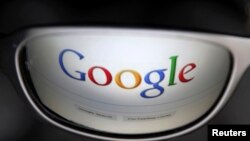A new study released Wednesday shows that Americans are concerned about a growing loss of online privacy in an increasingly digital world and that trust in both government and private industry to protect sensitive information is dropping.
The study, conducted by the Pew Research Center’s Internet and American Life Project, explores the definition and importance of privacy to Americans while using the Internet or mobile phones. It also explores which technologies are the most and least trusted, and where users place the blame for eroding privacy and security.
"We’re seeing folks are thinking about their privacy as being bound up in the security of various platforms," said Mary Madden, a Pew senior researcher and lead author of the report.
Madden said the project was spawned in part by revelations of hidden U.S. National Security Agency surveillance programs, as well as reports of massive credit information theft online.
"In the wake of Edward Snowden’s revelations of government surveillance and high-profile consumer data breaches, we wanted to get a sense of how these events might be affecting top of mind for the American public and what they’re thinking about privacy,” she said.
"We found eight in 10 respondents think Americans should be more concerned about government surveillance," Madden said. “And on the consumer side, nine in 10 say they agree that consumers have lost control over how their personal information is collected and used by companies, which tracks with other research we’ve done."
When it comes to defining what exactly privacy means in the digital world, respondents came up with a wide variety of answers and definitions, Madden said. But many of those definitions revolved around concepts of security and safety while online, meaning that for many, "privacy" and "security" are two side of the same coin.
"This study really points to the complexity of the issue and just how, over the past year and a half in particular, a lot of these issues around privacy and security are converging," she said. "What’s interesting is that in the tech world and even the law, privacy and security tend to be separate conversations in their separate communities. But increasingly we’re seeing the public thinking about their privacy as being bound up in the security of various platforms."
Confidence in those platforms, however, was almost universally low among respondents. Researchers asked participants about their confidence using six communication channels: landline phones, mobile phones, text messages, email, instant messaging and social media. All scored poorly.
"There’s not a single channel we asked about that a majority of adults feel secure using," Madden said. "So, even for landline phones, the highest trusted channel, only 16 percent of adults said they feel very secure. The least trusted mode was social media, with 81 percent feeling not very secure or not at all secure."
Madden said she and other researchers were surprised to find very few age-related differences among respondents concerned about their online privacy.
The biggest difference appears to be that while older Americans are more likely to have heard about private data breaches or government surveillance programs, younger Americans are more likely to have tried to manage their own digital footprint online.
As to what specific types of information or data Americans are most concerned about keeping private, far and away the most sensitive were Social Security numbers, health care and the content of phone and email conversations. Curiously, many respondents were not at all concerned about information such as personal shopping habits, favored media, political views, and who they’re friends with.
As researcher Adam Tanner previously told VOA, those very data sets are increasingly being used to create hundreds of millions of what Tanner calls "surprisingly intimate" portraits of individuals, which corporations then buy and sell to each other.
Pew’s Madden said the study did not examine how Americans might be changing their behavior to protect their privacy online; that, she said, will be the subject of the next study.
But she did say that it’s clear Americans are concerned about a growing loss of privacy in our increasingly digital world, and that trust across all entities and platforms is falling.











